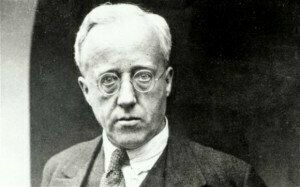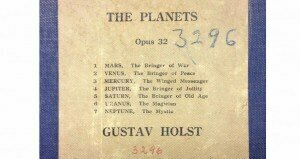
Gustav Holst
Gustav Holst: The Planets
 Holst worked on The Planets between 1914 and 1916, and initially scored the work for two pianos, four hands. “Neptune,” however was written for a single organ, as the sound of the piano was considered too percussive to portray a world as mysterious and distant. He subsequently scored the suite for full orchestra and wrote, “These pieces were suggested by the astrological significance of the planets. There is no program music in them, neither have they any connection with the deities of classical mythology bearing the same names. If any guide to the music is required, the subtitle of each piece will be found sufficient, especially if it used in a broad sense.” A private audience first heard the work at The Queen’s Hall in London on 29 September 1918, performed by the New Queen’s Hall Orchestra under the baton of Adrian Boult. The first public performance, omitting the “Venus” and “Neptune” movements took place on 22 November 1919 with the composer conducting. Finally, the London Symphony Orchestra under Albert Coates gave the first public performance of the complete work on 15 November 1920.
Holst worked on The Planets between 1914 and 1916, and initially scored the work for two pianos, four hands. “Neptune,” however was written for a single organ, as the sound of the piano was considered too percussive to portray a world as mysterious and distant. He subsequently scored the suite for full orchestra and wrote, “These pieces were suggested by the astrological significance of the planets. There is no program music in them, neither have they any connection with the deities of classical mythology bearing the same names. If any guide to the music is required, the subtitle of each piece will be found sufficient, especially if it used in a broad sense.” A private audience first heard the work at The Queen’s Hall in London on 29 September 1918, performed by the New Queen’s Hall Orchestra under the baton of Adrian Boult. The first public performance, omitting the “Venus” and “Neptune” movements took place on 22 November 1919 with the composer conducting. Finally, the London Symphony Orchestra under Albert Coates gave the first public performance of the complete work on 15 November 1920.